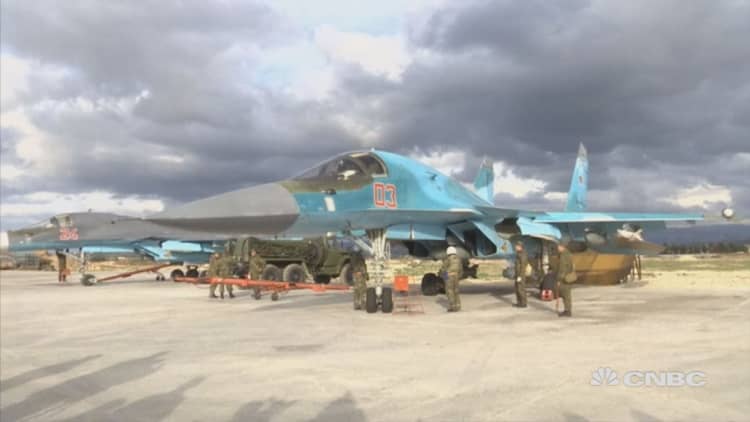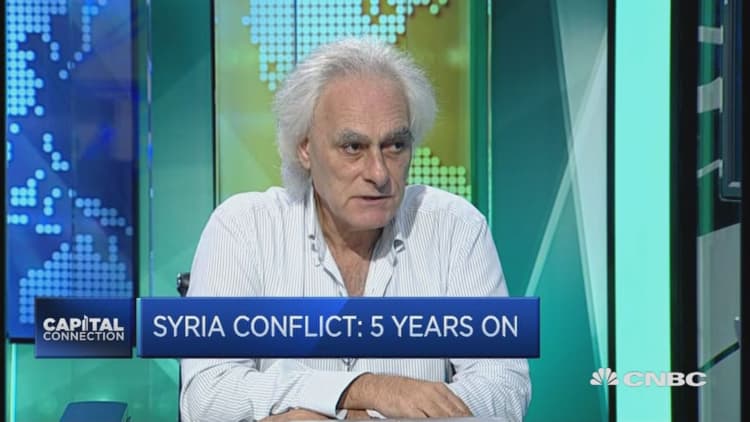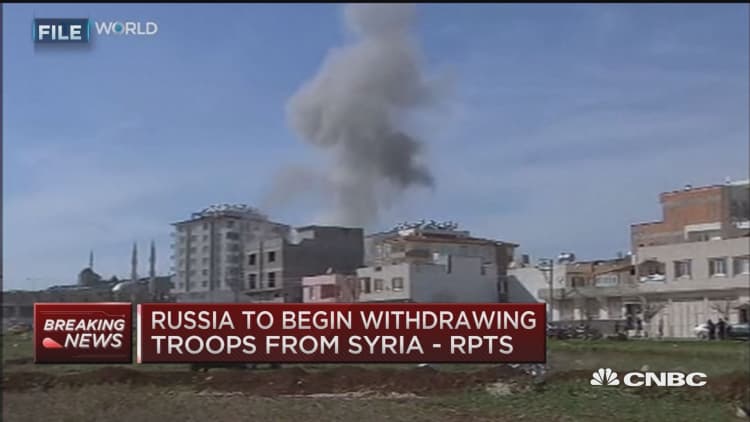The decision on Monday by Russian President Vladimir Putin to begin the process of pulling the "main part" of Russian troops out of Syria surprised many Russian experts and analysts. But it's more short-term political maneuvering by Putin, experts said, and it wouldn't take much to place Putin and the Russian military right back in the middle of the Syrian conflict.
Putin said that Russia had achieved its goals in Syria since the airstrikes began almost six months ago. Experts don't disagree.
"Putin got his immediate goals, which is stabilizing Assad, and he got the U.S. to treat Russia as an equal in negotiations," said Donald Jensen, senior fellow, Center for Transatlantic Relations at Johns Hopkins.
But Jensen said the announcement signals a halt to bombing and there's still no change regarding the buildup of Russia's bases there. "Russians will be there for many years in terms of military presence, so Putin has nothing to lose, really," he said.
Russia does plan to continue to operate its air base in Latakia, as well as its naval facility in Tartus.
On Tuesday, Russia's deputy defense minister said that the country's air force would continue airstrikes against "terrorists in Syria," RIA Novosti reported, according to Reuters, prompting confusion over the extent of Russia's withdrawal.



Experts pointed to Putin's broader positioning of Russia on the geopolitical stage as a factor that helps explain the sudden Syria policy shift, but one that also suggests it may not signal anything near a long-term change in military policy.
Matthew Rojansky, director of the Kennan Institute at the Wilson Center, said from the beginning of the operation the Russian president saw Russia's actions in Syria as bolstering its own position with Europe and the West. The Russian intervention turned the tide in Assad's favor and "allowed the Kremlin to cut a favorable deal with the West," Rojansky said. He added, "Putin can always order the troops back into Syria (in a single dramatic gesture or gradually) in response to an alleged breach of the deal by the West or its allies."
Robert Legvold, the Marshall D. Shulman professor emeritus of political science at Columbia University, said, "To a degree that Americans don't recognize, Putin sees his effort to put Russia again front and center on the diplomacy in the Middle East (as a quasi-partner and co-equal of the United States) on the line, and Assad's contrary statements over the last several weeks have been hampering that." He added, "If the situation for the Syrian regime again collapses, Putin can quickly send his air force back in. It will have the facilities already in place."
President of Eurasia Group, Ian Bremmer, said that this decision presents Putin as a constructive force in peace talks without undermining Russia's leverage on the ground.
"Putin knows there's no return to a unitary Syria (despite that being Assad's stated aim). Similarly, there's no ability of domestic or international forces to displace the existing Assad regime, and that's a perfectly acceptable place for Russia to be," Bremmer told CNBC.
Legvold said Putin wants to demonstrate to the world that he knows how to swiftly and efficiently use his forces and then get out, in contrast to the United States and other countries engaged in messy interventions — a message he does not mind conveying to states in his immediate neighborhood. Putin knows Russia could be stuck with an open-ended commitment in an ongoing quagmire, wasting a lot of money and at some point left with the choice of cutting and running. By moving now, he can claim "mission (deftly) accomplished."
Putin can always order the troops back into Syria (in a single dramatic gesture or gradually) in response to an alleged breach of the deal by the West or its allies.Matthew Rojanskydirector of the Kennan Institute at the Wilson Center
Factors, including low oil prices, Western economic sanctions that continue to squeeze Russia's economy, and Russia's decision to cut its defense budget 5 percent this year have been cited, but geopolitical experts told CNBC these weren't the likely triggers for the Syria decision.
The timing of the move is convenient, though, according to Rojansky, because the Syria pullout could quiet domestic opposition to Russian forces fighting in Syria in the first place ahead of the September Duma elections.
"This way, no one can campaign on a 'Bring our boys home' nationalist platform, and no one has to defend against that charge," Rojansky said.
The White House was taking a wait-and-see approach, though White House Press Secretary Josh Earnest said in response to the surprise move that Russia's "continued military intervention to prop up the Assad regime" was making a resolution in Syria more difficult to achieve.



